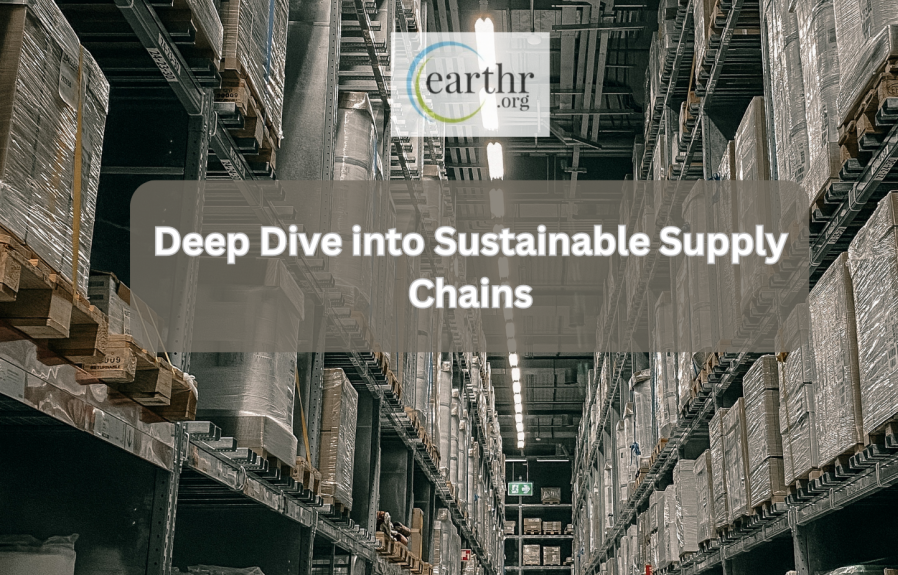Sustainability has become an essential issue for businesses worldwide. Supply chains, in particular, have a critical role to play in ensuring that companies are operating in a sustainable and environmentally friendly way. Sustainable supply chains are those that consider environmental, social, and economic factors throughout the entire supply chain process, from sourcing raw materials to delivering products to customers.

The need for sustainable supply chains has become increasingly apparent in recent years. The demand for products and services has grown significantly, leading to a corresponding increase in the use of resources and emissions. In addition, consumers are becoming more aware of the impact of their purchasing decisions on the environment, and are increasingly looking for eco-friendly and socially responsible products.
To achieve sustainability in supply chains, businesses must consider the environmental impact of their operations at every stage of the process. This involves evaluating the energy and resources used in production, transportation, and distribution. It also means assessing the environmental impact of sourcing raw materials and ensuring that suppliers are committed to sustainability.

One of the key challenges in developing sustainable supply chains is the complexity of the supply chain process. In many cases, companies have limited visibility into their suppliers’ operations, making it difficult to ensure that sustainability standards are being met. This is particularly true for global supply chains that involve suppliers from different regions and countries.
Despite these challenges, many companies have recognized the importance of sustainable supply chains and have taken steps to make their operations more sustainable. For example, some businesses have implemented sustainable sourcing policies to ensure that they are only using raw materials from suppliers who meet certain sustainability criteria. Others have implemented energy efficiency measures to reduce the energy consumption of their operations, while some have invested in renewable energy sources to reduce their reliance on fossil fuels.

There are also several initiatives and programs that companies can participate in to support sustainable supply chain practices. One such program is the Carbon Disclosure Project (CDP), which works to improve the environmental impact of supply chains by encouraging companies to disclose their carbon emissions and commit to reducing their carbon footprint.
Another initiative is the United Nations Global Compact, which encourages businesses to adopt sustainable and socially responsible policies and practices. The Global Compact provides a framework for companies to follow in developing sustainable supply chains, including principles related to human rights, labor standards, and the environment.
One of the benefits of sustainable supply chains is that they can lead to cost savings for businesses. By reducing waste, improving energy efficiency, and optimizing transportation and logistics, businesses can reduce their operating costs and improve their bottom line. Sustainable supply chains can also help businesses to reduce risk by ensuring that they are operating in a socially responsible and environmentally friendly way.

In addition to these benefits, sustainable supply chains can also have a positive impact on the environment and society. By reducing emissions and resource consumption, businesses can help to mitigate climate change and preserve natural resources. Sustainable supply chains can also contribute to social and economic development by supporting local communities and promoting fair labor practices.
However, achieving sustainability in supply chains is not a one-time effort. It requires ongoing commitment and investment from businesses, as well as collaboration with suppliers and other stakeholders. One of the keys to success is developing a comprehensive sustainability strategy that considers the entire supply chain process, from sourcing to delivery.
In conclusion, sustainable supply chains are essential for businesses looking to operate in a socially responsible and environmentally friendly way. By considering environmental, social, and economic factors throughout the supply chain process, businesses can reduce their carbon footprint, improve their bottom line, and have a positive impact on the environment and society. While achieving sustainability in supply chains is a complex and ongoing process, the benefits are clear and make it a worthwhile endeavor for businesses committed to creating a sustainable future.
Hope you found this blog helpful. We would like you to join our community earth.org where we talk about problems and solutions that can make our Earth a better place to live. Join us today to create an impact.



